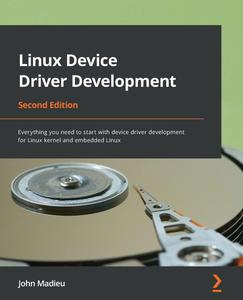
Free Download Linux Device Driver Development: Everything you need to start with device driver development for Linux kernel and embedded Linux, 2nd Edition by John Madieu
English | April 21, 2022 | ISBN: 1803240067 | 708 pages | EPUB | 5.83 Mb
Get up to speed with the most important concepts in driver development and focus on common embedded system requirements such as memory management, interrupt management, and locking mechanisms
Key FeaturesWrite feature-rich and customized Linux device drivers for any character, SPI, and I2C deviceDevelop a deep understanding of locking primitives, IRQ management, memory management, DMA, and so onGain practical experience in the embedded side of Linux using GPIO, IIO, and input subsystemsBook Description
Linux is by far the most-used kernel on embedded systems. Thanks to its subsystems, the Linux kernel supports almost all of the application fields in the industrial world. This updated second edition of Linux Device Driver Development is a comprehensive introduction to the Linux kernel world and the different subsystems that it is made of, and will be useful for embedded developers from any discipline.
You’ll learn how to configure, tailor, and build the Linux kernel. Filled with real-world examples, the book covers each of the most-used subsystems in the embedded domains such as GPIO, direct memory access, interrupt management, and I2C/SPI device drivers. This book will show you how Linux abstracts each device from a hardware point of view and how a device is bound to its driver(s). You’ll also see how interrupts are propagated in the system as the book covers the interrupt processing mechanisms in-depth and describes every kernel structure and API involved. This new edition also addresses how not to write device drivers using user space libraries for GPIO clients, I2C, and SPI drivers.
By the end of this Linux book, you’ll be able to write device drivers for most of the embedded devices out there.
What you will learnDownload, configure, build, and tailor the Linux kernelDescribe the hardware using a device treeWrite feature-rich platform drivers and leverage I2C and SPI busesGet the most out of the new concurrency managed workqueue infrastructureUnderstand the Linux kernel timekeeping mechanism and use time-related APIsUse the regmap framework to factor the code and make it genericOffload CPU for memory copies using DMAInteract with the real world using GPIO, IIO, and input subsystemsWho this book is for
This Linux OS book is for embedded system and embedded Linux enthusiasts/developers who want to get started with Linux kernel development and leverage its subsystems. Electronic hackers and hobbyists interested in Linux kernel development as well as anyone looking to interact with the platform using GPIO, IIO, and input subsystems will also find this book useful.
Table of ContentsIntroduction to Kernel DevelopmentUnderstanding Linux Kernel Module Basic ConceptsDealing with Kernel Core HelpersWriting Character Device DriversUnderstanding and Leveraging the Device TreeIntroduction to Devices, Drivers, and Platform AbstractionUnderstanding the Concept of Platform Devices and DriversWriting I2C Device DriversWriting SPI Device DriversUnderstanding the Linux Kernel Memory AllocationImplementing Direct Memory Access (DMA) SupportAbstracting Memory Access – Introduction to the Regmap API: a Register Map AbstractionDemystifying the Kernel IRQ FrameworkIntroduction to the Linux Device ModelDigging into the IIO FrameworkGetting the Most Out of the Pin Controller and GPIO SubsystemsLeveraging the Linux Kernel Input Subsystem
FileBoom
n7bl7.zip
Rapidgator
n7bl7.zip.html
NitroFlare
n7bl7.zip
Uploadgig
n7bl7.zip
Fikper
n7bl7.zip.html
